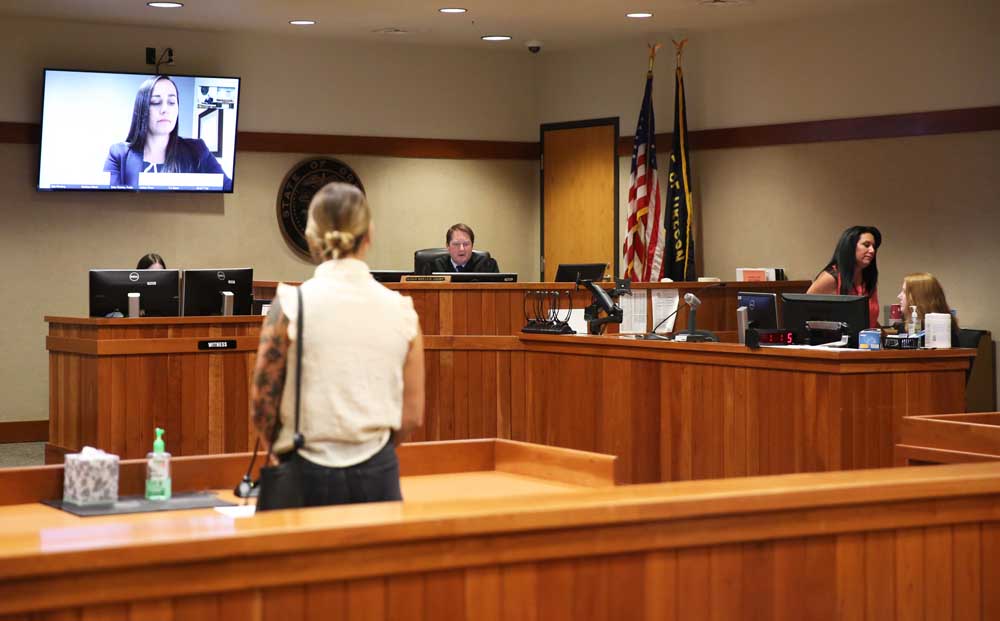Newly-appointed public defense head mounts effort to stem Oregon’s public defense pileup
Published 9:00 am Tuesday, June 3, 2025

- Court is in session in Judge Wells Ashby’s courtroom in the Deschutes County Courthouse in Bend in 2021.
The initiative estimates a year-long effort will be required of the Oregon Public Defense Commission to put a dent in the state’s public defender shortage.
When Gov. Tina Kotek fired the head of Oregon’s embattled public defense commission in April, she gave its new director until June 1 to come up with a strategy to end the state’s ongoing public defender shortage.
On Monday, Interim Executive Director Ken Sanchagrin announced just that: A 12-month-long, seven-point plan by the agency that seeks to expand contracts with lawyers and nonprofits across the state, increase voluntary caseloads for available attorneys and onboard law students who can be supervised while providing a defense for those accused of crimes.
The response marks the commission’s first attempt at addressing the shortage since Kotek overhauled its leadership two months ago. It doesn’t provide a timeline for exactly when the crisis should end, as Kotek requested in April, but Sanchagrin told reporters Monday that he estimates that counties most affected by the issue could see relief as early as mid-fall.
“We can make significant progress over the next 12 months, but I think that coming up with a date, as somebody who really lives in the data, that’s not something that is really possible at this point,” he said during a Monday media briefing. “Given the increases in filings, and then given also some of these new proposals that we’ve put out that may or may not also be impacted by some legislative decisions that are being made, that makes it extremely difficult.”
A Kotek press secretary said Monday that the governor could respond to the news on Tuesday. The announcement drew immediate praise from critics of the public defense agency’s prior approaches to solving the crisis.
“We need to honor the hard work of public defenders and provide the appropriate level of representation and service for indigent defense. This plan does that with enhanced capacity and recruitment,” said Sen. Anthony Broadman, D-Bend, in a statement Monday. “We will continue to leverage the Legislature’s accountability and oversight functions to ensure the agency has the tools to execute this plan and resolve the crisis.”
The public defense commission is an independent body with power delegated by the Chief Justice of the Oregon Supreme Court, designed with the goal of ensuring representation and defense counsel for all Oregonians. In April, it made headlines after Kotek fired its head leader and slammed the then-estimated number of Oregonians without representation for being at 4,000, which she had called “unacceptable.”
Oregon employs an array of centralized and deployable trial lawyers, public defenders, and nonprofit attorneys to help ensure that those who cannot afford an attorney are given proper defense, an obligation mandated by the U.S. and Oregon constitutions. The issue has long concerned officials, with a scathing 2019 study slamming Oregon’s “complex bureaucracy that collects a significant amount of indigent defense data, yet does not provide sufficient oversight or financial accountability.”
As of June 2, 3,779 people lack public defenders, according to the state’s dashboard, though Sanchagrin’s letter said that the number was upwards of 4,400 as of May 2025. The majority of cases involve the six “crisis” counties: Coos, Douglas, Jackson, Marion, Multnomah and Washington. Approaches in each of those localities will vary, but according to the plan, about 40% of an identified 176 attorneys with extra case capacity are based in these areas.
“What we’re hoping to do is to proactively work with those individuals to identify who is willing and who has the ability to take additional cases above and beyond current…limits amongst those individuals,” Sanchagrin said. “Then we can build that expectation into our contracts on the front end, which means it will be able to better predict and forecast what our case needs are going to be in a given area.”
In a statement, the Oregon Judicial Department said it was “encouraged by the urgency” demonstrated by Sanchagrin’s plan.
“While we have not yet had the opportunity to fully review this detailed document, we support this step toward data-driven solutions and stand ready to assist the OPDC as needed to move forward,” wrote Chief Justice Meagan Flynn in a statement.
Some of the plan’s ability to be implemented will hinge on current legislative and budget discussions currently underway at the state level, Sanchagrin said. Currently the Legislature is still negotiating the commission’s final budget and considering House Bill 2614, which would declare the public defense crisis an emergency and extend contract availability until July 2033.
Rep. Paul Evans, D-Monmouth, helped lead the push in 2023 for legislation that allocated around $90 million to overhaul the public defense system. He told the Capital Chronicle on Monday that the plan represents the “best opportunity we have for progress in sometime.” Citing ongoing negotiations, he declined to comment on the budget or the legislation but said “we are giving them more than the baseline they need to be able to serve to succeed.”
“We’ve purposefully taken the long view that this whole session of recognizing that public defense must be integrated into all aspects and you need the entire system healthy,” he said. “You can’t just put money into one compartment and say, OK, somehow it’s going to work out.”
The amount of in-custody unrepresented individuals has sharply decreased since January — around 30%, according to the commission. Much of that reduction, it says, is because of the work of its trial division, which has taken over 2,200 cases and deploys across the state to assist in cases requiring multijurisdictional authority or high levels of expertise to put on a defense.
Under the new plan, the trial division will seek out new counties and jurisdictions in which it can intervene in the crisis, said Aaron Jeffers, the division’s chief deputy defender.






